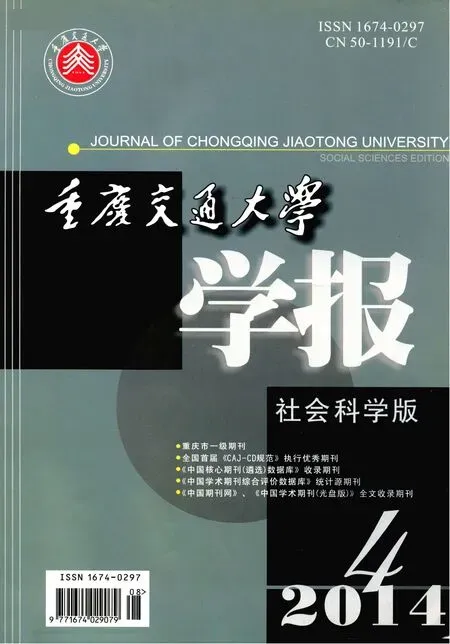英语“动词+定冠词+名词”习语的变体研究
贺阿丽
(1.山西师范大学外国语学院,山西 临汾041004;2.中央民族大学,北京100081)
习语在英语中指“结构相对固定的词组或短句,它的意义不是其构成词意义的相加”[1]。习语的特征可以归纳为整体性、凝固性和不可替代性[2]。McMordie认为:“一般说来,习语是不能改动的;习语中的任何词都不能以其它同义词来代替,习语中词的排列也很少能加以变动;任何改变措词和搭配的做法往往都会破坏习语,或可能使之变得毫无意义。”[3]
一般认为习语不允许发生词汇和句法层面的变体,但事实上,习语变体的可能性比预料到的要大得多。英语中有许多结构不同的习语,笔者在此选择“动词+定冠词+名词”结构的习语作为本文的研究对象。本文语料来自BNC(British National Corpus英国国家语料库)和Webcorp(网络语料库)以及相关词典和书籍,希望通过本文尽量说明习语的变体程度、原因以及定冠词“the”的重要性。
一、研究方法
Collins COBUILD Dictionary of Idioms(《柯林斯合作成语词典》,1995)中收录了英国、美国以及澳大利亚等英语国家所使用的4400条习语。笔者从中搜集了71个“动词+定冠词+名词”结构的习语。其中,有12个习语中的名词短语是复数形式。笔者在BNC(大型英式英语语料库,有九千万词汇文本材料和一千万英语口语材料)中搜索了这些习语的标准形式,也在Webcorp(网络语料库)上搜索了它们的非标准形式。
69个“动词+定冠词+名词”结构的习语有6个在BNC中检索不到,它们是 push the envelope,get the bump,count the beans,thumb the tube,spread the wildlife 及 get the axe。所以,研究对象主要是63个习语,其中,有些习语的语义基本相同,如:Kick the bucket,bite the dust及 buy the farm意思都是“死”;Stem the tide和stem the flow意思都是“制止……的蔓延;遏止……的势头”;Weather the storm和ride out the storm意思是“平安度过难关”;Bend the rules和stretch the rules意思是“变通规则;通融”;Learn the ropes和know the ropes意思是“掌握诀窍”;Test the water和test the waters意思是“试探反应;调查民意”;Grease the wheel和oil the wheels意思是“使某事顺利进行”。尽管以上习语意义相同,笔者还是搜索了这些习语,看看习语中同义词的替代能给搭配带来什么变化。本文的“变体”(modification)指用名词、形容词、限定词或不定冠词来替代“动词+定冠词+名词”结构习语中定冠词的现象。
二、英语习语内部变体
(一)Spill the beans的变体
写作的艺术是用行之有效的方法来吸引读者的兴趣。习语变体就是作者在写作时使用的一种文字创新。在笔者的数据库中,spill the beans是63个“动词+定冠词+名词”结构习语中唯一可以在内部结构及句法上创造出不同程度变体的习语。尽管在BNC中没有搜索到这个习语的任何变体,但是在网络上却搜索出62个变体的例子。WebCorp提供了这一习语的不同变体形式,在这些不同的变体中,四类前置修饰成分替代了原来的定冠词the出现在beans的前面。参看表1:

表1 spill the beans的内部变体(前置修饰成分变体)形式
根据表1,以下几类限定成分可以置于beans之前:所有格限定词、数量限定词、指示限定词、wh-限定词。
1.限定词。所有格限定词,如(1)I asked a handful of our top-performing members—including Neil—if they'd be good enough to come along and spill their beans。量词限定词,如(2)Time to spill some beans.(3)Parasound didn't really spill much beans on this one,but they've got an“audiophile grade”。指示限定词,如(4)This is the part of the story with the most spoilers,though,so I won't spill those beans right now。Wh-限定词,如(5)As Bolton fell over himself with enthusiasm to spill whatever beans he could on the Syrian/North Korean/Iranian weapons proliferation cooperation。
2.形容词,如(6)General manager spill fresh beans.(7)Iglasias says Goodling“Holds the keys to the kingdom”,which doubtless means she doesn't spill mere beans;she spills the meat。
3.所有格短语,如(8)Of course,that's no excuse for some thoughtless PR department to spill Apple's beans.(9)SEC may force lawyers to spill clients'beans。
4.名词,如(10)ANC funder to spill Oilgate beans。
这些前置修饰词很自然地置于beans之前。如名词的例子(10),所有格短语的例(8)和例(9),形容词和量词限定词的例(6)和例(2)都来自报纸文章的标题。在这些标题中,spill或以原形或以非曲折变化的形式出现。这表明spill the beans习语在有关“泄密”的新闻标题中作用重大,但在新闻的主体部分,spill the beans却没有出现。可见,这种变体只是为了吸引读者的注意力,此类标题暗示报道内容会非常轰动。这类新闻中,泄密内容与beans前置修饰词的所指相关。如“spill Oilgate beans”中,Oilgate指“石油公司”的丑闻。-gate意为“丑闻”,来源于“Watergate”(水门事件)丑闻,在此,-gate的使用和对spill the beans的变体都表明这则新闻具有轰动效应。
在spill much beans中,使用了修饰不可数名词的限定词much而不是合乎语法规则的many来修饰beans这一复数形式。这一例子表明,作者已根据习语中的spill和the beans分析了习语的意义:spill和the beans在语义上分别等同于“泄露”和“秘密(信息)”,“秘密”是不可数名词,所以语义上作者有使用much的理据。Spill mere beans和spill the meat进行对比的例子中,beans作为食物,在生活中没有meat那么重要,所以spill the meat是想要表达“泄露的是最重要的秘密”而非“一般的秘密”。Meat常具有“重要”这一习语语义,如在be meat and drink中,meat意为“受欢迎的东西”,这种变体可称为对比变体,表明有的习语也跟正常的短语一样可以分解。
(二)名词、所有格或限定词引起的习语变体
一些习语可被名词、所有格或限定词(所有格、指示词或数量词)或被二者同时修饰。笔者发现了20个这类习语。如:pass the baton,soften the blow,catch the eye,run the gauntlet,shoot the messenger,miss the boat,leave the nest,rule the roost,cross the Rubicon,stem the flow,ride the storm,bend the rules,stretch the rules,read the runes,test the waters,grease the wheels,oil the wheels和 foot the bill。例如:
(11)One has to leave one's nest and friends to pursue one's dreams and ambitions partly because of parents'wishes.
(12)The new Republican creed is to shoot any messenger of bad news.
以上习语变体形式的使用是为更明确地描述有关的人、事、概念或信息的接收人。习语的意义并没有因为形式的改变而被误解。媒体上出现的习语大都可以为取得特殊效果而采用变体形式。
(三)形容词引起的习语变体
在笔者所列63个习语中,只有5个习语可以通过形容词引起内部变体。如:foot the bill,ring the changes,cut the cord,get the picture 以及 tip the scales。例如:
(13)Knowsley Tax Payers to foot massive bill!
(14)Tokelauans tipped to cut colonial cord to Wellington.
(15)Confidently negotiate and tip difficult scales in your favor.
以上3例都是文章的标题。标题中习语变体的目的是要使语义更适合特殊的情景。形容词在句法上是名词短语的前置修饰成分,在语义上可在数量和质量方面起修饰作用,也就是说,形容词的修饰可有助于明确名词的所指对象。例(13)中,纳税人不得不支付“巨额”账单;例(14)中,属于新西兰的岛屿Tokelau,可能要寻求从Wellington的“殖民”中独立出来。
(四)新闻标题中的习语变体
大量英语习语可通过变体来适应商业、体育或广告类标题的需要。这些习语通常要通过名词、所有格和形容词的修饰来产生变体。当习语为适应新闻标题而变体后,往往使新闻标题变得幽默或严肃,从而产生各种效果,引起读者的注意[4]。语言的这种创新还可激起读者的阅读兴趣,给读者留下很深的印象。用于标题的习语有:make the grade,sweep the board,miss the boat,turn the table,stem the tide,stem the flow,rule the roost,foot the bill,tip the scales和soften the blow。例如:
(16)Will India's outsourcers rule China's roost?
(17)UNFPA charts new course to stem population tide
三、英语习语句法变体
Stathi(2006)继Gibbs等(1989)对习语的研究之后,又发现有一种习语的句法是可分析的。他解释说:“这类习语的构成成分同习语的语义部分是一致的。”[5]如:

这种可分解性使这类习语可以发生一定程度的句法变体。如上述习语spill the beans的宾语the beans可在被动式中做主语,其语义reveal the secret和“动词+定冠词+名词”结构习语有相同的句法结构。但是单单这一个例子不足以说明所有“动词+定冠词+名词”结构都能变为被动式。被动化的主要原因是:可分解的“动词+定冠词+名词”习语结构中的名词短语所表现的是这一习语的主要语义,而不是表现习语中动词的语义。笔者遇到过这样的例子:go the distance意思是reach the goal,这个结构不能变为被动式,因为习语的主要语义由动词reach而不是名词goal承载。
笔者发现有6个习语可以在句法上发生变体,尤其是变为被动式。这些习语的语义结构同其句法结构相同,习语和名词短语都在习语中表现重要语义。
(18)Goodling got the limited immunity based upon at minimum an outline of the beans she will spill(usually known as a‘proffer’).
上例中,the beans后跟含动词spill的关系从句。名词短语the beans从动词短语spill the beans中游离出来,用作介词of的补语,好像the beans一词的意思就是“秘密信息”。这不仅仅是内部变体,而且是句法变体。BNC提供了习语beg the question变体的两个例子。如下:
(19)For they beg the questions they ask by simply assuming the truth of individualism.
(20)It follows from this that any anthropologist who selects a particular category word from his own mother tongue,e.g.incest,marriage,family,myth,religion,and then embarks on some kind of cross-cultural study of institutions which he learns together under such headings,is begging all the questions which are serious interests!
例(19)尤为令人感兴趣,句中question与动词beg和ask共现。但很明显,我们不能交换两个动词的位置,如they ask the question they beg,beg the question在这里的语义是潜在的。在例(20)中,复数形式the questions把all作为前置修饰成分,关系从句作为后置修饰成分。这一习语变体既含有句法变体又含有内部变体。由于短文讨论的内容有关乱伦、婚姻、家庭、神话、宗教等,笔者认为作者在此有意改变了习语的固定搭配,以便吸引读者的注意。笔者还在网络上找到了习语结构变为被动式的4个例子:prick the bubble意为阻碍某事成功,ring the changes意为变换说或做的方式,miss the boat意为错过机会,pass the baton意为传递责任。
(21)Sorry conspiracy theorists prices of homes rose in response to blow off demand,and prices are now declining as the bubble was pricked.
(22)When he turned from the gay and corrupt world in which he lived,where the changes were rung incessantly upon self-interest,falsehood,pride,and the various,more or less refined forms of sensuality,
(23)Does the report effectively target the mounting problems that Western Sydney currently faces,or has the boat been missed on some issues?
(24)In fact,so successfully has the baton been passed on to his daughter Ameeta that Usha-breds have been enjoying a banner year(2003-05),smashing all opposition in the country.
(25)This article aims to understand how the dynamics of the public debate about the European Constitution changed when the baton was passed from the Convention to the Intergovernmental Conference and to the different national arenas that were expected to ratify the Constitution.
四、“动词+定冠词+名词”习语中的定冠词
(一)定冠词的用处
Davis引用 Lyons在 Definiteness(1999)一书中所说:“标准英语中,定冠词使用的四个原因是:熟悉度、可识别性、独特性和包容性。”[6]但是用于“动词 + 定冠词 + 名词”结构习语中的定冠词却和这四个原因无关。习语短语通常用于比喻,如kick the bucket的意思并不是“踢一个‘可识别’的桶的动作”,而是比喻“死”,来源于猪死时踢掉桶的习俗。而且在分析beg the question时,笔者发现这个表达式据说译自于拉丁语表达式petitio principii,但不是逐字翻译。在拉丁语表达式中,“petition”是名词,“principia”是所有格单数。拉丁语中没有冠词。从语言学的角度来说,“beg the question”是早期现代英语的变体形式,不是原始拉丁语直接的译借。笔者认为这个定冠词促成了习语语义的形成,可以参考由Lyons使用的术语“semantic definiteness(语义定指)”[7]。
(二)不定冠词替代定冠词
笔者发现在两个习语中,不定冠词可以替代定冠词。这两个习语是:prick the bubble和take the mickey。
(26)Those jokes have always been in pantomime,it's always been a place where you could take a mickey out of certain people and situations.
(27)He said monetary tightening is a highly inefficient tool to prick a bubble,and cites several instances where this has failed.
上两例中,作者似乎特意把定冠词换成了不定冠词,因为不定冠词不定指具体的情景。例(27)中,作者很了解定冠词指的是语义的确定性,所以他使用不定冠词来指语义的不确定性。
五、结论
习语变体是一个丰富的领域。经过变体的习语表达既新颖又有趣,而且可以表明变体的目的和意图。通过名词、所有格或限定词变体的习语所指对象更加明确;通过形容词变体的习语能更好地表现习语中的名词短语。习语变体的目的主要是为达到特别效果或是改变语体,大多数习语通过名词或限定词变体。
促成习语变体的主要原因是新闻标题的需要。新闻标题中使用习语变体往往会引起人们对新闻内容的好奇心,有时习语变体也是作者故意使用的策略,以便达到特殊的语体效果,吸引更多读者的注意。
研究还表明,kick the bucket或bite the bullet习语之所以不发生变体,是因为它们的变体对形成习语语义没有任何意义。在笔者所列出的习语中,有20个习语没有发生任何变体。
习语变体并不意味着习语不再是习语,相反,说明每一个变体都源于有意识的语言改动和深思熟虑后的符号选择。了解习语的变体给人们打开一个从社会心理层面了解英语的重要窗口,使人们具有更敏锐的语言洞察力。
使用互联网语料库有一定的风险,因为网络上某些习语的变体可能只是为取得诙谐或特别的效果而使用的临时变体。但网络上也会发现一些可信度高的非临时变体,可以反映变体习语当前的用法。
众所周知,“动词+定冠词+名词”结构习语大多数时候是较为固定的,但由于它们在词汇、语义以及句法上具有一定的灵活性,在一定语境中会发生各种变体。如果不能发生变体的习语可称为“完全固定的习语”(completely frozen idioms),那么这些能够灵活变体的习语便可称为“最不固定的习语”(least frozen idioms)。
[1]骆世平.英语习语研究[M].上海:上海外语教育出版社,2006:13.
[2]衡孝军.英语成语研究述略[J].外语教学与研究,1990(2):.
[3]McMordie W.English Idioms and How to Use Them[M].Oxford:Oxford University Press,1954:6.
[4]肖小月.英美新闻标题语言特色分析[J].重庆交通大学学报:社会科学版,2013(2):133-136.
[5]Stathi K.Corpus linguistics meets cognitive linguistics:A frame work of the analysis of idioms[C]//German Cognitive Linguistics Association,2006:28.
[6]Davis E H.The Definite Article in American English slang[EB/OL].[2013-09-23].http://209.85.173.104/search?q=cache:rNsSw_yawaEJ:www.cs.cmu.edu/~dhdavis/%27The%27%2520Paper.pdf+The+definite+article+in+American+English+slang.&hl=en&ct=clnk&cd=1.
[7]Sinclair J.Collins COBUILD Dictionary of Idioms[M].2nd ed..Glasgow:HarperCollins Publishers,2002.
——以英汉为例

